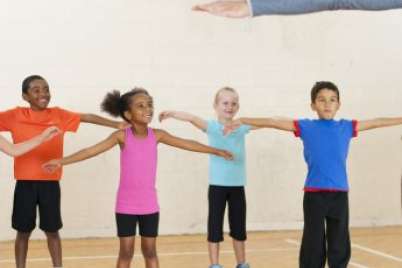
6 ways you can help turn your kids into great learners
Learning well is the key to so many opportunities for your kids. Children who are good learners do better in school and are kinder and more confident in themselves. They’re more willing to try new activities and not give up when the going gets tough.
Good teachers and good coaches, and good schools and good sports programs will help your kids learn, but, according to The Independent, studies are showing that a good attitude may be the most important factor in helping your child learn well.
A good attitude doesn’t come from a high IQ but from strong inner qualities like persistence and optimism. However, creating this positive mindset is a challenge for many kids these days. According to educators, though, parents can play a big role in helping their kids build up these inner strengths – even before they head off to science class or baseball practice.
Here are 6 character traits you can nurture in your kids to help them become good learners.
1. Love of Life
Kids who can have fun playing a game regardless of the outcome, who can wonder at nature, or who can enjoy just being at school with their friends – this appreciation of life feeds learning skills like confidence, excitement, and curiosity.
How you can help:
Use bedtime as an opportunity to talk about gratitude with your kids. Tell them three things you’re grateful for and, when they’re old enough, ask them to share three things they’re grateful for.
After practice or a game encourage your kids to thank their coaches for helping them.
Even little tiny kids in strollers can take in and appreciate the world around them. As you’re out walking mention the beautiful weather, the trees and flowers. Talk about the sights around you, the smells and sounds. Encourage your child to be in the moment by being in the moment with them. (A win-win situation!)
2. Resilience
If you don’t encourage your kids to take risks, they won’t know they can overcome challenges. Studies show resilient kids are more creative, can think with more flexibility and realism, and can better manage mental blues. They also have more positive inner self-talk. Letting in a couple of goals during a game doesn’t mean “I’ll never be a good goalie”; instead, it means “Well, that game didn’t go so well. I’ll ask Mom to kick a few balls at me before dinner so I can practice a little more. Maybe next time I’ll do better.”
How you can help:
Give lots of positive feedback when your child tries something new and encourage them to keep trying, particularly when it’s something that may result in frustration on their part, like falling off the monkey bars, or when it’s something you normally do for them, like tying their shoes.
Try different ways of practicing a skill so that they don’t get too discouraged by difficulty – if overhand throwing is too hard, try doing some underhand throws.
Your kids copy you and how you talk to them is ultimately how they’ll talk to themselves. You can help them grow their positive inner voice by speaking to them positively, especially when they’re struggling. Tell them about times you messed up, let them know things can be hard for you too but that you’ve learned from these times and they’ve only made you stronger.
3. Self-Discipline
In our attention-challenged culture, impulse control can be tough for adults let alone kids. But studies show that kids who can manage their time, who can persist when things get difficult, and who can take the time to absorb new learning and think about it – these kids will lead more satisfying lives.
How you can help:
Managing screen-time is an ongoing challenge for most families. But establishing a set daily amount and being firm about it will only help your kids. And here’s another chance for you to be a role model – put a limit on your daily smart phone time and let your kids see you sticking to it.
At practice and at games kids can get a little distracted, particularly when coaches aren’t their parents or a teacher they see every day. Encourage them to listen to and learn from their instructors.
Martial arts are a great way for kids to learn focus, responsibility, and respect. Many dojos start kids as young as 4.
Give your kids age-appropriate responsibilities. Even kids as young as 3 can be given simple tasks like helping to put away their toys. Despite how they may act in the moment, kids do enjoy the deeper sense of independence and satisfaction that doing regular household jobs gives them.
4. Honesty
Self-talk comes into play again here. A child who can be honest with themselves can say: “I’m doing okay with my reading but I don’t quite understand fractions yet.” Or “I’m good at throwing but I’m having a hard time with kicking.” And this honesty will lead them to more learning. Honesty also means saying “I don’t know” and learning rather than pretending to know.
How you can help:
Even though it’s difficult (and contrary to how you may feel about encouraging your kids) try not to over-use general praise like “good job” whenever they put their dirty clothes away or kick the ball in the right direction. Try saying “Thank you” when your child completes a responsibility or task and save the “good jobs” for things that are really well done. Too much praise and kids can get hooked on needing that positive ‘head pat’ from others which means they’ll always be looking to others for approval – not a good mindset for learning let alone for life.
Also, if you focus on the process (running, kicking, and passing the ball, for example) rather than the results (scoring goals and winning) kids will learn they don’t have to be good at everything right away – a growing problem with kids today – and they’ll learn to evaluate their own skills more honestly.
5. Courage
Learning new things means venturing off into the unknown, and this can be scary. Good learners are just as scared as other kids but they can manage their fear and go ahead anyway. And they can try again after they fail.
How you can help:
Encourage your kids to take risks. Be a role model for courage by letting them see you do something you’re scared of, whether it’s trying water skiing or starting a new job.
Support your kids to take more physical challenges, from climbing trees, to hanging upside-down on the monkey bars, to going “up” the slide.
6. Kindness
A child who learns well is kind to themselves. They get that learning is a challenge and there will be ups and downs. They can cheer themselves on when things get tough. Being kind also brings good relations with others, whether in the classroom or on a team. And having the support of others helps with learning.
How you can help:
We don’t mean to sound like a broken record here (remember those?), but again, you can be the best model for your kids by being gentle to yourself. When you make a mistake let them see you being gentle with yourself. Rather than calling yourself names or getting angry, try: “Oops! I didn’t mean to do that, let’s try again.” Let your kids see that everyone makes mistakes and that it’s okay.
At the playground, encourage your children to let other kids take a turn on the swings or the slide first.
At a game, encourage your kids to cheer for the other team too. You can do the same by showing support for all the kids while you watch.





